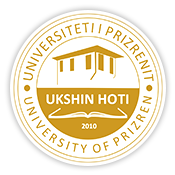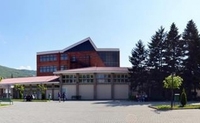Mision, aims and administration
The Bachelor program of the Faculty of Law is compiled in accordance with the rules of the curriculum of the first cycle of study in (General Law), which is based on the Law "On Higher Education in the Republic of Kosovo" and the Statute of the UPZ. The study program and diploma issued are accredited. The study program is designed in accordance with the objectives of the respective study program, its curriculum and its teaching activities. First-cycle studies provide basic knowledge on general scientific methods and principles and specific skills in a wide variety of professions and specialties. Studies in this cycle are realized with 240 credits and their normal duration is 4 (four) years. At the end of the first cycle study programs the student is provided with Bachelor's Degree. The Bachelor study program aims to equip the student with:
- a. Knowledge and basic concepts of the field of study;
- b. Ability to a profession or a professional license;
- c. General civic formation;
- d. Basic Skills for Research;
- e. General Practical Applicative Skills;
- f. Personal promotion training;
With regard to the changes in the syllabus compared to the licensed programs for the effect of improving the program, the changes relate to the increase in the importance of basic and indispensable training courses, especially in category B, by increasing their weight in program and credits for this purpose. Thus, some subjects that were previously 5 ECTS have passed 6 ECTS or 7 ECTS or vice versa.
The syllabi of each subject are stored and maintained by the program's administrative staff or Head of Learning. A copy of the program syllabus will be attached to this program.
SWOT analysis for mision, aims and administration:
A. Strenghts:
The "General Law" study program is designed in accordance with the goals and mission of the institution.
• The "General Law" study program has defined its objectives in providing knowledge in the field of law. Students are oriented on the objectives of the study program and expectations in gaining knowledge.
• First cycle study programs aim at providing basic knowledge, general science methods and principles.
• The possibilities of providing a variety of professions and specialties are guaranteed by the content of the curriculum.
• Study programs aim to meet the needs of the labor market, in line with the strategic goals of national economic development;
B. Weakness:
• Lack of realization of the park - clinical teaching within the faculty, respectively the courtroom.
• Lack of financial means for the implementation of the plan in the practice of visiting the relevant institutions during the course of the lecture.
• The plan does not foresee students' exchange during the 4-year learning cycle.
C. Opportunities:
• The institution, for the assessment of labor market needs, conducts a market study, which includes:
- employment opportunities for students in the local or regional market, national and international;
- employers' requirements;
- an approximate estimate of the expected number of students enrolled in this program;
- the number of registered persons in similar programs in the sister institutions.Institucioni ofron programme studimesh që nuk bien ndesh meinteresat kombëtare;
• The study program aims to assist and promote the preservation of national cultural values, based on the best domestic and foreign legal tradition.
D. Threats
• This program is highly advanced and rich in clinical subject bidding as a necessary course to gain practical knowledge that will enable Profesors to develop the professional experience of the Faculty with all other relevant institutions for students to experience the advantages of their studies in a professional environment, the main challenge is to combine practice with the relevant Institutions.
• Program Compatibility with General Social Innovations.
• Competing with other relevant international programs.
• Implementation of the methods and experience of international institutions in the realization of plan programs.
Quality Assurance
For the internal quality assurance, the organizational management structures of the UPZ are more specifically upheld, which have been established and comply with the requirements of the Law "On Higher Education in the Republic of Kosovo", as well as the Quality Assurance Office. The activity is organized according to an annual plan (Action Plan) in which the controls in the sectors or processes subject to control are programmed and accompanied by reports with the respective findings. Meanwhile, the Quality Office informs faculty leaders, and through them all UPZ staff about the results of the conducted controls, with the aim of taking measures to continuously improve the performance of the institution, its core units and individuals in the future.
- In March 2012, the Management of the University of Prizren has established the Quality Assurance Office with the task of facilitating the implementation of the principles listed above. At national and European level, the University of Prizren is committed to use as guiding documents within the European Higher Education Area as well as those of the Republic of Kosovo:
1. The Bologna Declaration;
2. "Quality Assurance Quality Standards and Guidelines in the European Higher
Education Area", European Association for Quality Assurance in Higher Education
(AESC)
3. The Lisbon Convention;
4. Kosovo Law on Higher Education;
5. Guidelines of the Kosovo Accreditation Agency
2. There are three filters that a program must pass in order to be applicable for evaluation by the Accreditation Agency. The focus group of the particular faculty (consisting of the Dean of the faculty, professors, students) proposes a study program in the Senate of UPZ to be approved by providing facts and feasibility. The Senate then gives recommendations to the Rectorate, which brings a final decision.
3. Study programs have been prepared by faculty commissions guided by the dean of the faculty. Usually the programs have been reviewed based on the recommendations of international experts.
4. The following immeasurable and qualitative (quantitative) instruments are used to provide and extend the quality:
1. Questionnaires
2. Interviews
3. Monitoring
4. Evaluation schemes
5. Self-evaluation reports
And any other useful instrument, such as: double entry, external consultancy as defined in the university's legal documents.
6. UPZ did the evaluation of professors at each semester, based on the evaluation drafts the report which it submits to UPZ management. It is within the competence of the management to make decisions and measures based on the overall evaluation results at the university.
SWOT Analysis for Quality Assurance:
A. Stregths
• Quality management is regulated by legal and sub-legal acts.
• The teaching process is monitored by the quality office within UPZ.
• Respecting international standards in the teaching and learning process.
• Quality management is done according to the European market, where faculty promotes quality culture.
B. Weakeness
• Lack of electronic-digital monitoring of professors in the teaching process.
• Lack of online literature in Albanian.
• Lack of electronic-digital monitoring of students in the learning process.
• Lack of an office within the faculty for quality monitoring.
C. Opportunities
• Both internal and international quality assurance experts have maintained working tables with academic staff, administration and students in relation to quality assurance.
• In terms of external quality control, frequent accreditation processes continue to maintain the quality issue as a point in the agenda of Ukshin Hoti University's Law Faculty in Prizren.
• The experience created by the academic and administrative staff will affect the quality of the program and the achievement of the objectives of the Program.
D. Threats
• Creation of new halls and spaces of internship within the University.
• Application of clinical teaching in the courtroom of the law faculty.
• Online communication between students and students.
Academic Staff
The staff part consists of staff with academic titles, scientific degrees and a part in the process for obtaining ranks.
Academic staff is divided into full-time and part-time staff.
Full-time academic staff is contracted with a term of 4 (four) years, and consists of directors, internal academic staff with Prof.ass.dr. and Prof.asoc.dr. The part-time academic staff consists of external academic staff, assistant, lecturer and invited professor.
• Number of full time and part time teachers by number and gender
|
Full time |
Part time |
Total |
||||||||||
|
No. |
Fakulty |
F |
M |
T |
|
F |
M |
T |
|
F |
M |
T |
|
1 |
LAW |
0 |
7 |
7 |
|
11 |
22 |
33 |
|
11 |
29 |
40 |



